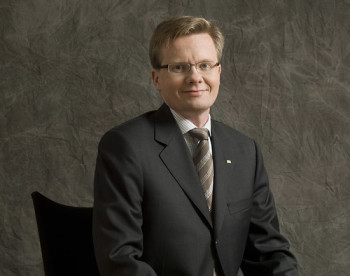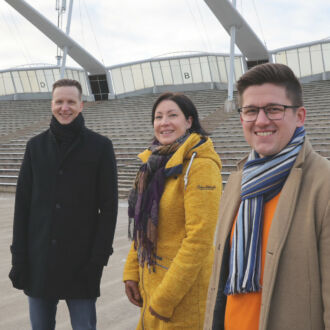With the population ageing and the baby-boom generation starting to retire, more attention is being given to employee well-being in Finnish working life. How can employees be encouraged to stay on at work right up to pensionable age, while staying fit and active? Solutions are being found at national and workplace level. Even better, action to boost well-being at work is proving to be an investment that benefits companies and their staff.
A few years ago, Lassila & Tikanoja Plc, a company engaged in environmental and property maintenance, woke up to the fact that incapacity to work was causing the company enormous costs and that the challenge posed by an ageing workforce would be a key competitive factor in the future.
“Direct staff-related costs account for about half of our total expenditure, so ensuring the working capacity of our personnel is an absolutely crucial element in our future success,” explains director Jorma Mikkonen.
Containing the cost of disability
In Finland, responsibility for dealing with and paying for occupational health and work disability is shared among many different actors. Big companies are required by law to provide for occupational health services, the Social Insurance Institution (KELA) deals with per diems and benefits that come under general social security, and companies handle pensions through their own pension foundations or one of several pension insurance companies. Every person resident in Finland is entitled to municipal healthcare services. The various cash flows and cost sources are complicated and difficult to follow within both society as a whole and individual companies. Research by Guy Ahonen published in 2004 indicated that work disability generated about 10 billion euros in costs every year, 2.5 billion of this in the 500 biggest companies.

Jorma Mikkonen: economic losses from work disability were enormous.Photo: Lassila & Tikanoja
“Here at Lassila & Tikanoja, we started to calculate the economic impact of work disability in 2005. It was a huge job digging out all the actual costs, but one well worth doing. We found that the company’s economic losses from work disability were about 20 million euros a year. That’s an enormous sum – nearly 40% of our net profit,” says Mikkonen.
The contributions for employment-related pensions paid by Finnish employers are at 11 levels, the lowest being 20% of total payroll and the highest 31%. The percentage a company has to pay depends on the level of its work disability costs during the two previous years. That means action to promote employee health and working ability can have a substantial impact on business costs.
“With our cost structure, there is a drift of about 14 million euros in pension contributions,” explains Mikkonen. “So the conclusion to be drawn was obvious: investing in maintaining and raising work capacity was definitely worthwhile.”
Fit on retirement
Lassila & Tikanoja has devised a work capacity management programme called Sirius, aimed at ensuring that as many employees as possible stay fit and healthy right up to normal retirement age.
“Today, companies are financially responsible for staff work disability, yet have no effective way of managing what this costs. Expensive decisions are made elsewhere, and companies just have to pay up. At L&T we launched a programme that allows us to actively influence these costs,” Mikkonen continues.
The processes of work capacity management are anchored in an accounting approach that treats realized costs as investments and constantly measures the financial impact of action taken.
The range of measures available to Sirius is extensive. One of the programme’s most important dimensions was a new agreement under which the nationwide company’s entire occupational health services were put into the hands of a single provider. This speeds up and simplifies employee tests and treatments, spreads good practices efficiently, and generates a central bank of information about staff healthcare challenges and needs.
Another important investment is in work safety and ergonomics.
“Nowadays, we pay serious attention to correct working positions and lifting and handling technique. For instance, if the driver of a waste collection truck jumps down from the cab onto a slippery street dozens of times a day, his joints aren’t going to last him till he retires. He has to take a bit longer and use steps,” explains Mikkonen.
L & T places staff in suitable jobs
The company supports sports and leisure activities that help prevent health problems and keep employees fit. Supervisors are encouraged to intervene as soon as possible in problems with intoxicants and mental health, for instance, and to help employees find suitable treatment and rehabilitation. Employees unable to do their previous jobs because of waning strength or injury are actively helped to find other work within the company and if necessary retrained for it.
“Employees who can no longer cope with their previous jobs are treated at L & T as ‘key clients’ and we do everything we can to find them, or specially tailor for them, suitable work. Relocation is always a more financially sound option for the company than premature retirement. Many companies don’t seem to realize this,” says Mikkonen.
For such cases, the company has special Sirius instructors who help employees to get used to new tasks and arrange support services when necessary. The plans are formulated jointly by the employee, the supervisor and a doctor. Most employees are keen to make the move to different work. Lassila & Tikanoja has even developed completely new services manned partly or entirely by staff with some impairment.
The margin earned on these services does not need to be very great, because the company is already making a significant profit from the fact that they are still workers and not pensioners.
For special situations there is also a crisis fund called ‘Medi-Heli’ after an emergency helicopter service of the same name. If necessary, this can used when swift decisions are needed to save work capacity and health, for instance to pay for fast private-sector surgery on an injury sustained in an accident.
Work capacity aid targeted beyond the ongoing quarter
“In the Sirius programme, the most important factor is the change in attitude. Top management monitor how the programme is used and its effects extend to every supervisor and worker. We used to think of money spent on occupational health as a cost, but now it’s viewed as an investment. The financial indicators see it that way, too: an additional spending of 2 to 3 million euros on staff work capacity can yield 10 million in cost savings, and that has a significant impact on competitiveness and profits,” Mikkonen sums up.
Labour shortage will become a problem. No company can afford to waste able hands. For comparison, Mikkonen says that Lassila & Tikanoja can easily spend 60 million euros a year on machinery and equipment, and no-one questions the sum.
Half of the workforce will be retiring during the next 10 years. Finnish labour is a shrinking natural resource that should be better taken care of.
“People shouldn’t be treated like machines that are used until they break down and then replaced. This isn’t obvious if you look at things by the financial quarter, but we are investing in well-being in the long term.”
|
Markku’s injured leg doesn’t stop him working Back to work after lengthy sick leave L & T maintenance man Markku Pihlakari was injured about four years ago in a fall when a ladder slipped from under him. His leg was operated on several times and he went through rehabilitation, but he was unable to return to outdoor work such as snow clearing and gritting because the leg is too stiff to enable him to operate the machinery. After a long sick leave Markku was found a completely different job in charge of the loading bays at a large shopping centre. “I have to make sure the loading bays are kept clean and in order, and advise the cleaners and shop staff on waste handling,” Markku explains. The Sello shopping centre houses over 160 shops. It has to deal with enormous volumes of goods, and if the whole system is to work efficiently and safely it is vital for nothing to be left lying around. It’s Markku’s job to ensure this, and both customers and the fire inspector are satisfied. “People aren’t disposables, and Lassila & Tikanoja understand that. It’s good to see a company that meets its responsibilities and looks after its people.” says Markku Pihlakari. |
Lassila & Tikanoja PlcThe Finnish listed company Lassila & Tikanoja Plc specializes in environmental maintenance and support services for real estate and properties. Its turnover is in excess of 500 million euros and it employs some 9,500 people. L&T also operates in Sweden, Latvia, Russia and Norway. |
By Salla Korpela, January 2008



